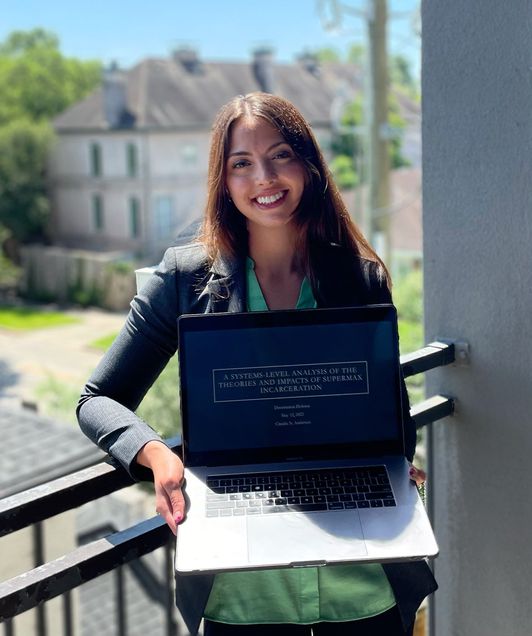Introducing Dr. Claudia Anderson, CISS Post-Doctoral Scholar
 Dr. Claudia Anderson is a postdoctoral fellow at the Center for Innovation in Social Science, working with Dr. Jessica Simes. Her position is funded by Arnold Ventures. Dr. Anderson’s research examines the implications of punishment and correctional policies for individuals, systems, and communities. In particular, her work aims to shed light on how prison systems function and the consequences of prison policies, with a focus on solitary confinement and racial/ethnic and gender disparities in punishment experiences. For more information on Dr. Anderson’s research and publications, see her Google Scholar page. Here, you can read “Is Reduced Visitation a Collateral Consequence of Restrictive Housing?” and “Private Versus Public Incarceration: Incarcerated Individuals’ Experiences and Perceptions of Environmental Quality,” among other recent publications of hers. Learn more about Dr. Anderson below in a brief interview with CISS communications intern Lily Belisle!
Dr. Claudia Anderson is a postdoctoral fellow at the Center for Innovation in Social Science, working with Dr. Jessica Simes. Her position is funded by Arnold Ventures. Dr. Anderson’s research examines the implications of punishment and correctional policies for individuals, systems, and communities. In particular, her work aims to shed light on how prison systems function and the consequences of prison policies, with a focus on solitary confinement and racial/ethnic and gender disparities in punishment experiences. For more information on Dr. Anderson’s research and publications, see her Google Scholar page. Here, you can read “Is Reduced Visitation a Collateral Consequence of Restrictive Housing?” and “Private Versus Public Incarceration: Incarcerated Individuals’ Experiences and Perceptions of Environmental Quality,” among other recent publications of hers. Learn more about Dr. Anderson below in a brief interview with CISS communications intern Lily Belisle!
What made you decide to be a social scientist/ why does social science matter to you?
Social science allows you to look at the world around you, identify problems and questions, and then use research to advance understanding about these problems and potential solutions. I personally find it very satisfying and fulfilling to use a scientific method to advance knowledge in ways that, hopefully, can contribute to policy and make the world a safer, more humane, and more equitable place.
Can you tell us about a current research project that you’re excited about?
Right now, Jessica Simes and I are using data on Pennsylvania’s state prison system to understand whether legal interventions, such as settlements, are useful in reducing the use of solitary confinement for incarcerated people with severe mental illness.
What has led you to the intersection of disciplines within which your expertise lies?
Criminology and the study of corrections systems, which is my area of work, draws on the work of several fields, such as public health, sociology, and psychology. In my personal research agenda, I make an effort to integrate work from these and other fields to inform my research questions and orient myself on a particular topic.
How does your research benefit from an interdisciplinary approach?
My academic training is in criminology, with a focus on corrections, but my research agenda is very much informed by the work of sociologists. I am fortunate to have the opportunity to work closely with sociologists here at BU.
What do you hope to accomplish during your time at BU?
I hope to expand my perspectives and research skills, and learn from the fantastic scholars that work here at BU. More broadly, I hope to keep building a research agenda that can contribute to policy change.